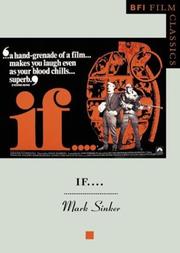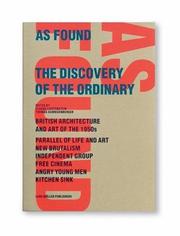| Listing 1 - 9 of 9 |
Sort by
|
Book
Year: 1969 Publisher: London : Studio Vista,
Abstract | Keywords | Export | Availability | Bookmark
 Loading...
Loading...Choose an application
- Reference Manager
- EndNote
- RefWorks (Direct export to RefWorks)
Film
Year: 2007 Publisher: S.l. : Facets Multi-Media,
Abstract | Keywords | Export | Availability | Bookmark
 Loading...
Loading...Choose an application
- Reference Manager
- EndNote
- RefWorks (Direct export to RefWorks)
Book
Abstract | Keywords | Export | Availability | Bookmark
 Loading...
Loading...Choose an application
- Reference Manager
- EndNote
- RefWorks (Direct export to RefWorks)
Book
Year: 1987 Publisher: Dallas, Tex. University of Texas
Abstract | Keywords | Export | Availability | Bookmark
 Loading...
Loading...Choose an application
- Reference Manager
- EndNote
- RefWorks (Direct export to RefWorks)
Film --- Anderson, Lindsay --- Anderson, Laurie
Digital
ISBN: 9783319948034 Year: 2018 Publisher: Cham Springer International Publishing :Imprint: Palgrave Macmillan
Abstract | Keywords | Export | Availability | Bookmark
 Loading...
Loading...Choose an application
- Reference Manager
- EndNote
- RefWorks (Direct export to RefWorks)
This book is the first of its kind to trace the development of one of the largest and most important companies in British cinema history, EMI Films. From 1969 to its eventual demise in 1986, EMI would produce many of the key works of seventies and eighties British cinema, ranging from popular family dramas like The Railway Children (Lionel Jeffries, 1970) through to critically acclaimed arthouse successes like Britannia Hospital (Lindsay Anderson, 1982). However, EMI’s role in these productions has been recorded only marginally, as footnotes in general histories of British cinema. The reasons for this critical neglect raise important questions about the processes involved in the creation of cultural canons and the definition of national culture. This book argues that EMI’s amorphous nature as a transnational film company has led to its omission from this history and makes it an ideal subject to explore the ‘limits’ of British cinema.
Film --- Directing --- TV (televisie) --- film --- Anderson, Lindsay --- Great Britain

ISBN: 1844570401 Year: 2004 Publisher: London British Film Institute
Abstract | Keywords | Export | Availability | Bookmark
 Loading...
Loading...Choose an application
- Reference Manager
- EndNote
- RefWorks (Direct export to RefWorks)
If-- (Motion picture : 1968) --- Mark Sinker --- film --- filmgeschiedenis --- twintigste eeuw --- Groot-Brittannië --- Anderson Lindsay --- 791.471 ANDERSON --- If-- (Motion picture : 1968). --- If-- (Motion picture)
Digital
ISBN: 9781137539434 Year: 2016 Publisher: London Palgrave Macmillan UK :Imprint: Palgrave Macmillan
Abstract | Keywords | Export | Availability | Bookmark
 Loading...
Loading...Choose an application
- Reference Manager
- EndNote
- RefWorks (Direct export to RefWorks)
Lindsay Anderson was a highly influential personality within British cinema, mostly famous for landmark films like This Sporting Life (1963) and If….(1968). This book deals primarily with hitherto unexplored aspects of his career: his biographical background in the British upper class, his devoted film criticism, and his angry relationship to contemporary society in general. Thus, the book contains, for instance, chapters about his childhood in India, his writings about John Ford, his relationship to French star Serge Reggiani, his work on TV in the 1950s, with scripts provided by blacklisted scriptwriters, his troubles with the British film establishment, and his gradually emerging concern regarding himself being Scottish, not English. The book also has some chapters written by close friends of Anderson, who died in 1994, dwelling on his penchant for controversy and quarrel, but also on his remarkable artistic talent and strong commitment.
Sociology of culture --- Didactics of the arts --- Ethnology. Cultural anthropology --- Film --- Directing --- History of civilization --- History --- filmgeschiedenis --- etnologie --- cultuur --- film --- geschiedenis --- Europese cultuur --- Anderson, Lindsay --- Great Britain --- Europe
Book
ISBN: 1137539429 1137539437 Year: 2016 Publisher: London : Palgrave Macmillan UK : Imprint: Palgrave Macmillan,
Abstract | Keywords | Export | Availability | Bookmark
 Loading...
Loading...Choose an application
- Reference Manager
- EndNote
- RefWorks (Direct export to RefWorks)
Lindsay Anderson was a highly influential personality within British cinema, mostly famous for landmark films like This Sporting Life (1963) and If….(1968). This book deals primarily with hitherto unexplored aspects of his career: his biographical background in the British upper class, his devoted film criticism, and his angry relationship to contemporary society in general. Thus, the book contains, for instance, chapters about his childhood in India, his writings about John Ford, his relationship to French star Serge Reggiani, his work on TV in the 1950s, with scripts provided by blacklisted scriptwriters, his troubles with the British film establishment, and his gradually emerging concern regarding himself being Scottish, not English. The book also has some chapters written by close friends of Anderson, who died in 1994, dwelling on his penchant for controversy and quarrel, but also on his remarkable artistic talent and strong commitment.
Culture --- Ethnology --- Motion pictures --- Cultural and Media Studies. --- Directing. --- British Culture. --- British Cinema. --- Film History. --- Study and teaching. --- Europe. --- Great Britain. --- History. --- Production and direction. --- Motion picture producers and directors. --- Anderson, Lindsay, --- Criticism and interpretation. --- Directors, Motion picture --- Film directors --- Film producers --- Filmmakers --- Motion picture directors --- Moviemakers --- Moving-picture producers and directors --- Producers, Motion picture --- Motion pictures-Production and d. --- Ethnology-Europe. --- Motion pictures-Great Britain. --- Motion pictures-History. --- British Cinema and TV. --- Motion pictures—Production and direction. --- Ethnology—Europe. --- Motion pictures—Great Britain. --- Motion pictures—History.

ISBN: 3907078438 Year: 2001 Publisher: Baden Lars Müller
Abstract | Keywords | Export | Availability | Bookmark
 Loading...
Loading...Choose an application
- Reference Manager
- EndNote
- RefWorks (Direct export to RefWorks)
Architecture --- anno 1950-1959 --- Great Britain --- Arts, British --- Architecture, British --- Arts --- Aesthetics, British --- Arts britanniques --- Architecture britannique --- Esthétique britannique --- History --- Philosophy. --- Histoire --- Philosophie --- Edited by Claude Lichtenstein, Thomas Schregenberger --- Groot-Brittannië --- twintigste eeuw --- kunst --- architectuur --- interieurvormgeving --- Henderson Nigel --- Paolozzi Eduardo --- Fischli Peter --- Weiss David --- Fischli & Weiss --- Stirling James --- Gowan James --- Bill Max --- Lewerentz Sigurd --- Price Cedric --- St. John Wilson Colin --- Füeg Franz --- Hamilton Richard --- Anderson Lindsay --- Cordell Magda --- Richardson Tony --- Lassally Walter --- Sillitoe Alan --- Delaney Shelagh --- Osborne John --- Banham Reyner --- stedenbouw --- urbanisme --- Tanner Alain --- Goretta Claude --- Lambert Galvin --- theater --- film --- pop art --- design --- collages --- beeldhouwkunst --- literatuur --- Angry Young Men --- Kureishi Hanif --- Smithson Alison --- Smithson Peter --- 7.038 --- 72.036 --- 791.43 --- Esthétique britannique
| Listing 1 - 9 of 9 |
Sort by
|

 Search
Search Feedback
Feedback About UniCat
About UniCat  Help
Help News
News